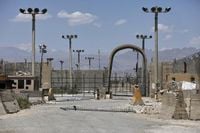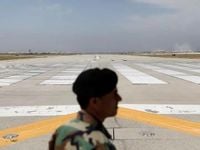On September 20, 2025, the already fraught relationship between the United States and Afghanistan took a dramatic turn, as former President Donald Trump issued a blunt threat to Afghanistan regarding the Bagram air base. In a post on his Truth Social platform, Trump declared, "If Afghanistan doesn't give Bagram Airbase back to those that built it, the United States of America, BAD THINGS ARE GOING TO HAPPEN!!!" The statement, reported by Reuters and other major outlets, instantly reignited debate over the future of the strategic military facility and the possibility of renewed U.S. military involvement in the region.
Bagram air base, situated just north of Kabul, has long been a symbol of American military power in Central Asia. For two decades after the September 11, 2001 attacks, it served as the central hub for U.S. operations in Afghanistan. The sprawling compound was, at its peak, a small city unto itself, boasting supermarkets, well-known American fast-food outlets such as Dairy Queen and Burger King, and a large prison complex. The base hosted visits from U.S. presidents, including Barack Obama in 2012 and Trump himself in 2019. However, in July 2021, U.S. and NATO troops withdrew from Bagram in a chaotic exit that marked the end of the American military presence in Afghanistan—an event that critics have described as a disorderly retreat.
The withdrawal, executed under President Joe Biden but rooted in a 2020 deal brokered by Trump with the Taliban, led to the rapid collapse of the U.S.-backed Afghan government and the Taliban's swift return to power. The Taliban promptly seized Bagram, along with other American installations, and have since maintained a firm grip on the facility. This has not sat well with Trump, who has repeatedly criticized the loss of Bagram, often highlighting its proximity to China and its strategic value.
Trump's recent remarks are not his first foray into advocating for the reacquisition of strategic global assets. Over the years, he has floated ideas about acquiring territories and sites ranging from the Panama Canal to Greenland. Yet his fixation on Bagram has been particularly persistent, with the former president suggesting during a recent state visit to the United Kingdom that Afghanistan’s economic difficulties might make the Taliban more amenable to American overtures. He argued that the Taliban, facing internal pressures and resource constraints, could be swayed by the promise of international assistance. Still, Trump has not detailed any specific strategic plan for the base’s future use, leaving many questions unanswered.
When pressed by reporters at the White House on September 20 about whether he would consider sending U.S. troops to retake Bagram, Trump was characteristically evasive. "We won't talk about that, but we're talking now to Afghanistan, and we want it back and we want it back soon, right away. And if they don't do it, you're going to find out what I'm going to do," he said, as reported by The Tribune and other outlets. He further confirmed that discussions with Afghanistan are ongoing but declined to provide any direct answer about the possibility of military force, simply stating, "We won’t talk about that."
The threat of military action has alarmed both American defense experts and international observers. According to Reuters, current and former officials warn that retaking Bagram could require more than 10,000 troops and advanced air defense systems, effectively amounting to a full-scale reinvasion of Afghanistan. Such an operation would undoubtedly risk significant conflict with the Taliban government and could have far-reaching consequences for regional stability.
The response from Afghanistan’s rulers was swift and unequivocal. On September 21, Fasihuddin Fitrat, chief of staff of Afghanistan's ministry of defence, stated in comments broadcast by local media, "A deal over even an inch of Afghanistan's soil is not possible. We don't need it." The official Afghan government later issued a statement emphasizing that "Afghanistan's independence and territorial integrity are of the utmost importance." The Taliban’s chief spokesman, Zabihullah Mujahid, echoed this sentiment, urging American policymakers to adopt more pragmatic approaches and reminding Washington of its commitments under the Doha Agreement—specifically, the pledge to respect Afghanistan’s sovereignty and refrain from internal interference.
This categorical rejection of any renewed U.S. military presence at Bagram marks a decisive moment in post-withdrawal U.S.-Afghanistan relations. As reported by Al Jazeera and other international outlets, the Taliban leadership is determined to assert complete control over Afghan territory and maintain its hard-won independence. The group’s recent celebrations at Bagram, where abandoned American military equipment was paraded in a symbolic show of triumph, further underscored this resolve and drew sharp reactions from White House officials.
Trump, for his part, has not missed an opportunity to criticize President Biden’s handling of the withdrawal, calling it a demonstration of "administrative incompetence." The former president’s renewed push for Bagram comes at a time when the Biden administration faces renewed scrutiny over its Afghanistan policy, especially as the Taliban marks the third anniversary of its return to power.
Despite the rhetorical fireworks, there are signs of limited diplomatic engagement between the two governments. Both sides have maintained communication channels, particularly on humanitarian issues and the fate of American hostages. Earlier this year, the Taliban released an American citizen detained while traveling through Afghanistan, and agreements on prisoner exchanges have been reached—steps that Taliban officials view as preliminary moves toward eventual diplomatic normalization.
The strategic importance of Bagram cannot be overstated. Its location and infrastructure make it a valuable asset for regional security operations. Yet, the legacy of the base is complicated. Human rights organizations such as Amnesty International and Human Rights Watch have repeatedly raised concerns about abuses committed at Bagram during the U.S. occupation, particularly regarding detainee treatment during the "War on Terror." The original airfield dates back to the 1950s, built with Soviet assistance, later expanded during the Cold War and the Soviet occupation, and then transformed by the Americans into a vast military complex.
As the international community watches closely, the standoff over Bagram has become a litmus test for the future of U.S.-Taliban relations and American influence in Central Asia. The evolving dynamic between Washington and Kabul highlights the complex challenges of engaging with a government that the U.S. does not formally recognize, while still seeking to maintain leverage on issues ranging from counterterrorism to human rights.
For now, Afghanistan’s leaders have made their position clear: no deal over Bagram is possible, and any attempt to force the issue will be met with firm resistance. As both sides navigate this delicate and volatile relationship, the world waits to see whether cooler heads will prevail—or if the specter of renewed conflict will return to haunt the region once more.






